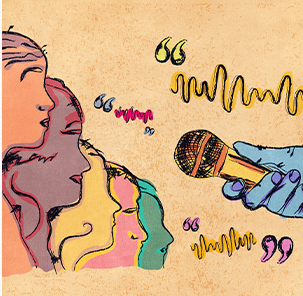Subscribe and receive the best Inkyfada podcasts straight to your mailbox.
Don't miss out! Subscribe to our newsletter to receive the latest Inkyfada podcasts.
Thanks for your inscription
Unsubscribe at any time

In this first part of episode 2, our guests, prominent academic historians, will discuss the issue of written sources that inform us about the events of the 7th and 8th centuries, particularly the early Arab conquests and the beginnings of Islam.
The oldest of these writings date back to the 9th century, and new historical details only appear several centuries later in the books of later historians. They are often influenced by tribal affinities or partisan preferences.
From Ibn Khayyat and Ibn Abdelhakam to Ibn Khaldoun, Al-Tamimi, Al-Bakri and Ibn Idhari, we will become familiar with authors who will appear in our following episodes through their texts. We will discover the arduous task assigned to the historian who must decipher manuscripts, comment on them, compare them, confront the sources, and draw from them the most credible and closest account of what happened. *
Today we are pleased to have as our guests Ms. Hayet Amamou, (medieval historian specializing in Early Islam), Mr. Fathi Bahri, historian and archaeologist specializing in the Middle Ages, former director general of the INP, Mr. Mohamed Ben Abbes, historian specializing in Late Antiquity and Early Middle Ages, Mr. Mohamed Hasan, historian specializing in the Middle Ages, and Mr. Faouzi Mahfoudh, archaeologist and historian specializing in Islamic art and architecture and former General Director of the INP (National Heritage Institute).
*The podcast director extends his sincere thanks to the honorable professors Adnan El Ghali and Nouri Boukhchim.
Inkyfada Podcast is the first platform entirely dedicated to original Tunisian podcasts, and was conceived by Inkyfada media in collaboration with the in-house research and development laboratory, InkyLab. Inkyfada joined the global podcast boom in 2017, when the team produced the first Tunisian audio documentary, diving deep into the belly of the El Kamour struggle taking place in the desert. Since then, Inkyfada Podcast has produced a wide variety of documentaries, investigations, and podcast series, as well as articles accompanied by music; covering a multitude of contemporary issues in order to offer an immersive and alternative podcast experience. Whilst exclusively offering audio content, the Inkyfada Podcast team upholds the same core values and principles of inkyfada.com, and is committed to producing high quality content though a dynamic and meticulous production process. In addition to the permanent team, Inkyfada podcast works closely with various journalists, artists, illustrators, musicians and other content creators in order to diversify the platform and support artistic creativity. These podcasts differ from traditional radiophonic content in that the applied production and editing process is more akin to cinematographic techniques, in addition to being web-based, downloadable and accessible on demand. Additionally, Inkyfada Podcast uniquely offers subtitles in French, Arabic and English for all audio content, the majority of which is recorded in Tunisian or in the preferred language of the speaker in question.